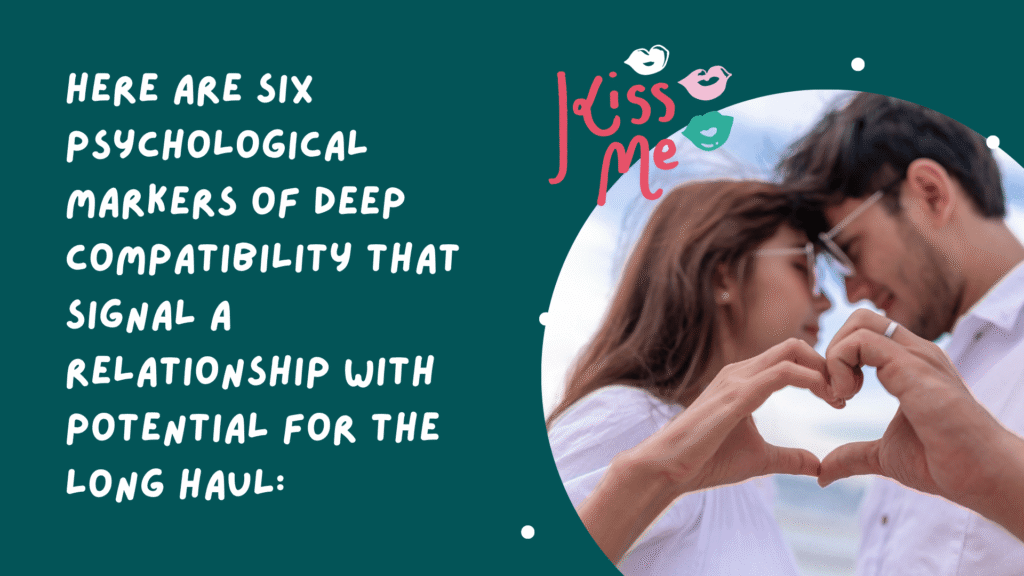Articles, Relationships
6 Signs You’re in a High-Compatibility Relationship Built to Last
Sometimes, the challenge isn’t finding the right relationship—it’s recognizing when you already have it.
Unlike the romanticized journeys we see on screens, real love is crafted. It’s a conscious choice, a consistent effort—not a fairy tale. If you feel at home rather than on a rollercoaster, you may be in a partnership poised to endure.
Here are six psychological markers of deep compatibility that signal a relationship with potential for the long haul:
You Feel at Peace
That calm sense of peace? That’s powerful. In long-term love, comfort isn’t settling—it’s security. You don’t need fireworks every day when you can fall asleep feeling safe.
When you instinctively know your partner has your back, you’re tapping into a foundation of trust and emotional safety. Renowned therapist Dr. Gerald Jampolsky once described love as “what we feel when we feel safe with someone.” You’re not coasting—you’re resting confidently in partnership.
Example: After a stressful workday, you don’t need distracting outings. Relaxing on the couch with your favorite meal and soft conversation feels just right.
You Resolve Old Relationship Patterns
No one enters a relationship without emotional baggage. What separates enduring couples is recognizing and redirecting these unhelpful patterns.
Psychological studies show conscious interventions—like mindfulness, journaling, or couples therapy—can shift deeply embedded habits and promote healthier communication.
Example: Maybe your knee-jerk response to criticism is to shut down emotionally. Instead, you pause, share that you’re hurt, and invite your partner to clarify. Over time, this keeps you from slipping into old scripts at the first sign of tension.
You Realize You’re Responsible for Your Own Happiness
This is a relationship superpower. If you expect all your joy from someone else, disappointment will eventually follow. The strongest couples know each has control over their own joy—and they’re each other’s greatest ally in that.
Psychology confirms: Emotional dependency, not independence, predicts lower satisfaction and more conflict.
Example: You pursue painting because it feeds your soul—not because you expect your partner to admire every canvas. Your joy is yours to create—and you love sharing it with them.
You Embrace One Another Completely
True acceptance means celebrating the whole person, even the quirks. You’re not fixing them—you’re loving all of them.
Research shows that feeling fully accepted—not just tolerated—is strongly linked to relationship maturity and affectionate feelings.
Example: You don’t roll your eyes at your partner’s terrible puns—instead, you laugh (or groan together). Their weird sock habit? You admire that they embrace their silly side.
You Want the Same Big Picture
Compatibility isn’t just emotional—it’s practical. The life puzzle only fits when key pieces align: career goals, living environments, plans for children (or none), financial outlook.
Compromise is vital—but not if it costs your core. Misaligned life goals are the most common long-term deal-breaker relationship experts cite.
Example: One dreamed of city life, the other longed for country calm. They paused before moving in, attended workshops imagining each scenario, and only merged hopes when both clearly said “yes.”
You Both Truly Want It to Work
No relationship is conflict-free. What matters is how you handle conflict—and whether both of you fundamentally want to show up when things get hard.
Studies show that expressing gratitude, active listening, and consistent caring behaviors strongly predict long-term relationship stability.
Example: After a heated disagreement, you each own your mistakes, listen to understand, and follow up with small kindness every day—proof you’re committed to rebuilding and growing.
Why It Matters
These compatibility signals are much more than feel-good concepts—they’ve been validated by psychology:
- Peace equals resilience, reducing stress and emotional burnout.
- Self-aware couples derail cycles of hurt and create positive change.
- Emotional independence fosters stronger bonds, not weakened ones.
- Acceptance breeds authenticity, a core ingredient of intimacy.
- Ideal-aligned couples report higher relationship satisfaction.
- Committed partners survive the toughest challenges together.
Is This Your Relationship?
Pause and truly reflect:
- Do you consistently feel satisfied with just being with them?
- Have you noticed old relational triggers surfacing—and consciously chosen different responses?
- Are you emotionally independent—available, but not reliant?
- Do you laugh with them about their quirks?
- Are your major life goals aligned?
- And do you both genuinely show up—even after a fight?
If you can say “yes” to most—it’s a strong signal you’re in a highly compatible partnership. If you’re missing some elements, that doesn’t doom you—it’s an invitation to work together, grow, and strengthen what truly matters.
Growth Is the Margin
Great relationships don’t happen by magic—they happen through magic: the magic of choice, effort, empathy, and alignment.
If your relationship checks off these compatibility signs—or you’re inspired to align with them—you’re on a promising path toward something that can absolutely go the distance.
Here’s to building a love that’s calm in storm, committed in conflict, and brimming with respect and intention. Because real love isn’t found, it’s forged—one thoughtful choice at a time.

